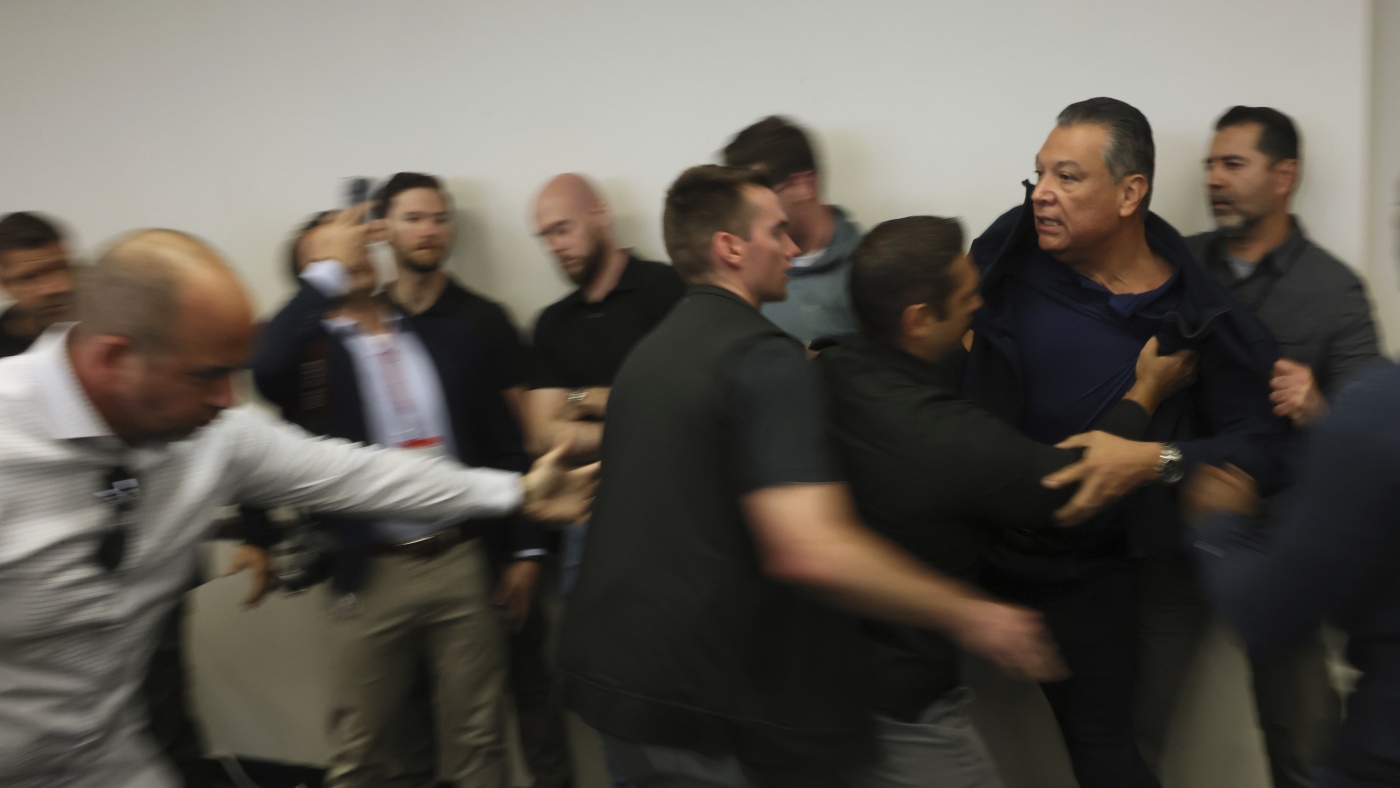Senator Alex Padilla’s forcible removal from Homeland Security Secretary Kristi Noem’s press conference in Los Angeles on June 12, 2025, serves as a sharp lens into the complexities and conflicts pervading current immigration policy debates in the United States. The incident not only highlights the intense polarization around immigration enforcement but also raises crucial questions about government transparency, democratic oversight, and the balance between security and accountability. This analysis unpacks the event, its political and social context, the roles of the key actors involved, and the broader implications for American democracy.
An Unsettling Confrontation: The Incident at the Wilshire Federal Building
At the heart of this incident was a moment charged with tension and symbolism. During a press briefing where Secretary Noem sought to present the Department of Homeland Security’s (DHS) escalated deportation plans, Senator Padilla interrupted to ask questions relevant to his oversight role. The immediate and forceful physical removal of a sitting U.S. Senator — a rare and dramatic measure — stunned observers and ignited debates about appropriate conduct, authority, and respect within government proceedings.
The actions of federal agents, who pushed Padilla to the ground and handcuffed him despite his protests of elected status, reflect a rigid assertion of control over the event’s narrative and environment. Yet this use of force against an official with a constitutional mandate to oversee immigration policy strikes at foundational democratic norms. The incident draws attention to the fragile contours of civil discourse in moments of political friction.
Conflicting Narratives: Security or Suppression?
The divergent accounts of this event unfold a deep schism. On one side, DHS officials and Secretary Noem’s team describe Padilla as disruptive, claiming that order and security necessitated immediate intervention. On the other, Padilla’s camp frames the removal as an unwarranted suppression of legitimate oversight, a stark infringement on his right and responsibility to hold the executive accountable.
These competing narratives embody a central tension: the executive branch’s need to manage its message and maintain control during sensitive policy announcements versus elected officials’ constitutional duty to engage, question, and represent public interests. The incident spotlights how security protocols, if applied inflexibly, risk muffling democratic dialogue and elevating confrontation over collaboration.
Political Backdrop: Immigration Enforcement in a Divided Nation
This flashpoint cannot be detached from the broader landscape of immigration debates in California and nationally. Secretary Noem’s push to intensify deportations reflects a federal stance increasingly at odds with California’s political climate, where immigrant communities hold substantial influence and local leadership advocates for more humane immigration approaches.
Senator Padilla’s history as an immigration advocate, including support for legislation facilitating citizenship pathways for essential workers, explains his urgency and determination in seeking accountability during the press conference. His removal thus transcends a procedural disturbance — it signifies a clash of visions for the nation’s approach to immigration enforcement, immigrant rights, and community integration.
The Institutional Roles: Oversight vs. Enforcement
Senator Padilla’s position as the ranking member of the Senate Judiciary Immigration Subcommittee confers upon him a vital oversight function. By seeking direct answers from Secretary Noem, he exercised a fundamental aspect of legislative checks on executive power, particularly in policies directly impacting millions of constituents.
Conversely, Secretary Noem’s role embodies the executive mandate to implement immigration policies that meet federal priorities, including enhanced enforcement. Her stewardship of such high-stakes announcements requires presenting a controlled, clear narrative, often under significant public scrutiny and protest pressures.
The clash reflects institutional intentions and roles: accountability and transparency from the legislative viewpoint, operational command and security focus from the executive perspective. The friction between these aims, if not carefully managed, can escalate into public disputes risking institutional trust.
Democratic Principles and the Use of Force
The use of physical force against a senator in a government setting poses unsettling questions about democratic norms. Freedom of speech and the right to question government officials are pillars of American governance. The event illuminates a tension between maintaining security at high-profile events and upholding the democratic mandate for open scrutiny and debate.
The incident stresses the importance of establishing protocols that prevent such confrontations from escalating to physicality. It calls for a reexamination of how government agencies balance order and openness in an era where political polarization amplifies every disruption.
Public and Media Reaction: A Mirror to Societal Divides
Widespread media coverage and online discourse quickly transformed the episode into a symbol of broader political and cultural divides. Visual evidence of Padilla’s removal fueled partisan critiques, reflecting entrenched views on immigration enforcement policies and government authority.
The incident galvanized calls across the political spectrum for investigations, highlighting the heightened sensitivity of immigration enforcement as a flashpoint in American politics. It also underscored how federal actions, especially in immigrant-rich areas like Los Angeles, can escalate tensions rather than facilitate dialogue.
Conclusion: A Defining Moment of Democratic Challenge
Senator Alex Padilla’s forcible removal during Secretary Kristi Noem’s press conference crystallizes the deep fissures shaping contemporary American politics and immigration discourse. More than a mere procedural skirmish, it offers a stark illustration of political contestation, institutional roles, and the fragility of democratic practices in high-stakes policy arenas.
This episode challenges all branches of government to reaffirm commitments to constructive dialogue, transparent oversight, and respectful engagement—even amid contentious debates. As the nation grapples with immigration’s complexities, the manner in which such conflicts are handled will profoundly influence public trust, governance quality, and the enduring strength of democratic institutions.

